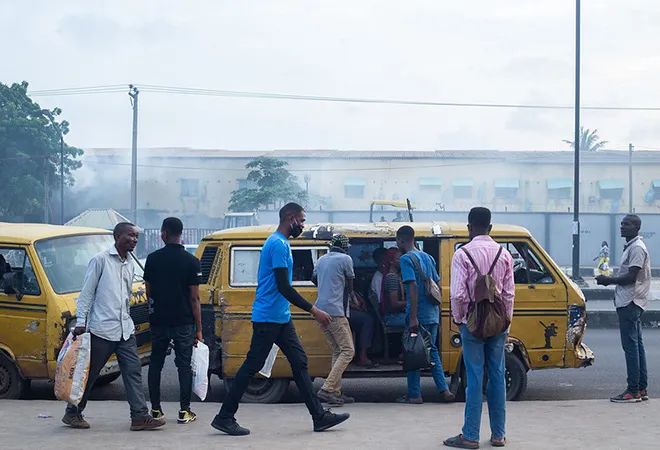-
CENTRES
Progammes & Centres
Location
The pneumonia-like disease caused by coronavirus has dealt a heavy blow on all the sectors of Nigeria’s economy, including the day-to-day lives of individuals’ resident in the heterogeneous country.

It has been a little over a year since Nigeria recorded its index case of the novel coronavirus on 27 February 2020, in Lagos. Months have gone by, yet the country grapples to contain the pneumonia-like virus which emanated from a local market in Wuhan, China, spreading across 200 countries of the world and killing over 2,048 people in Nigeria, according to the Nigeria Center for Disease Control, the country’s infectious disease agency. As of 29 March 2021, the centre has recorded at least 162,593 tested cases, which represents more than 0.0769 percent of the country’s population of over 200 million.
Interestingly, about two-third of the 162,593 people infected with COVID-19 have recovered after treatment, indicating some level of success recorded by the country’s frontline health workers. The health war is fierce and unlike other countries of the world, Africa’s giant, Nigeria, is threatened by a rather inefficient and insufficient testing capacity.
It took a period of nine months for Nigeria’s supposed antigen-based rapid diagnostic test for COVID-19 to hit a milestone of 120,000 on 24 January 2021 from the 1,000 cases reached on 25 April 2020.
Unfortunately, since the country declared a second wave of the pandemic in December 2020 following an increase in infections, Nigeria has averaged over 1,000 confirmed cases daily, hence, typifying how fast the virus spreads on an hourly basis.
The pneumonia-like disease caused by coronavirus has dealt a heavy blow on all the sectors of Nigeria’s economy, including the day-to-day lives of individuals’ resident in the heterogeneous country.
Judging from existing statistics, the economic downturn in Nigeria was ignited by a combination of declining global oil benchmark and spillovers from the COVID-19 outbreak, following the enforcement of the social distance policies, which led to the grounding of economic activities.
Like a father to his needy child, the Nigerian government responded to the crisis by providing financial assistance and household palliatives to support and cushion plausible effect of the pandemic on its citizens, but these efforts could not bring about the much needed succor as the process was faulty, and the COVID-19 palliative response team was accused of being corrupt.
It is, however, not surprising that the country, within the pandemic period of hopelessness recorded major economic damages which was reflected in the failing development index, such as the manufacturing index and fixed investment, thereby, leaving affected Nigerians in a state of despair, hunger, and confusion.
These inglorious times in Nigeria’s economy saw the most populous black nation slide into its second recession in five years after the country’s gross domestic product for the second quarter in 2020 whizzed. Fortunately, Nigeria’s economy recovered after about two months following the ease in production cost and higher oil prices from the Organisation of Petroleum Exporting Countries (OPEC).
Economic experts believe a stronger economic recovery is likely. The government’s forecast for growth of 3 percent in 2021 is projected to be double that of the International Monetary Fund, which had earlier warned that a slow rollout of COVID-19 vaccines could threaten the full recovery of the economy.
It is rather presumptuous to say that an unplanned and unforeseen situation could pose no fresh challenges in any country, while this may be true, experts believe that such threats if timely addressed is capable of rebuilding the fortunes of the economy.
Like a thief at night, the novel coronavirus shook the foundations of many countries, including those with the best of technologies and healthcare. Notwithstanding the slow-paced reactive measures from developing countries, nations around the world continue to employ diverse combatant strategies, from preventing, detecting, controlling, to mitigating the impact and spread of the deadly virus.
Developing African countries like Nigeria, may have done significantly well in curtailing the virus even though the existing poor health facilities and incapacitated local pharmaceutical companies seem to have made a mockery of its giant efforts.
The failings of Nigeria’s public health sector made it difficult for Nigerians to cope during the period of lockdown, as it became more evident that most of the active ingredients used by the country’s pharmaceutical industry were imported from China and only 10 percent of the drugs used are locally made in Nigeria.
As it is with the country’s healthcare system, so is with the local pharmaceutical companies; the industry is facing enormous challenges such as poor infrastructural and unreliable utilities, scarcity of skilled workers, poor access to finance, lack of appropriate government incentives, incoherent policies by the government, poor demand due to robust competition from Asian companies particularly China, high cost of doing business as a result of imported and expensive production inputs, regulatory problems, among others.
As the virus spreads, countries across the world struggle to suppress and possibly bring an end to the deadly coronavirus cycle through different scientific laboratory inventions and vaccine trials, but same can hardly be said of the local drug manufacturers in Nigeria, whom were ostensibly handicapped during the lockdown, while the government tried without commensurate success to salvage the decaying healthcare system which further heightened the poor management and death of some infected patients.
Hence, it suffices to say that management of the public’s health overwhelmed the government at the peak of the pandemic outbreak.
The positive news, however, is that the pain and uncertainty caused by the pandemic appears to be gradually easing away as Nigeria’s government in February 2021, took a delivery of 3.92 million doses of COVID-19 vaccines developed by the University of Oxford and AstraZeneca through the COVAX facility aimed at vaccinating 20 percent of the population.
Despite this nerve-calming development, there are concerns from some public health experts and citizens of Nigeria that spreading conflicting and sometimes confusing information on the vaccine deployment may hinder the process.
Meanwhile, health observers want the government to relax in its sensitisation of the public on steps that should always be taken to contain the virus as the vaccination programme will take a year before it is fully effective.
It is, therefore, noteworthy that the pandemic and its consequent effects is of no curse to the world as countries must always be prepared for eventualities, both in healthcare and in its socio-economic well-being.
The views expressed above belong to the author(s). ORF research and analyses now available on Telegram! Click here to access our curated content — blogs, longforms and interviews.

Peace Chikodinaka Eze is a Broadcast Journalist with vast knowledge in covering issues of development crisis politics and gender.She is a Co-anchor of one of ...
Read More +